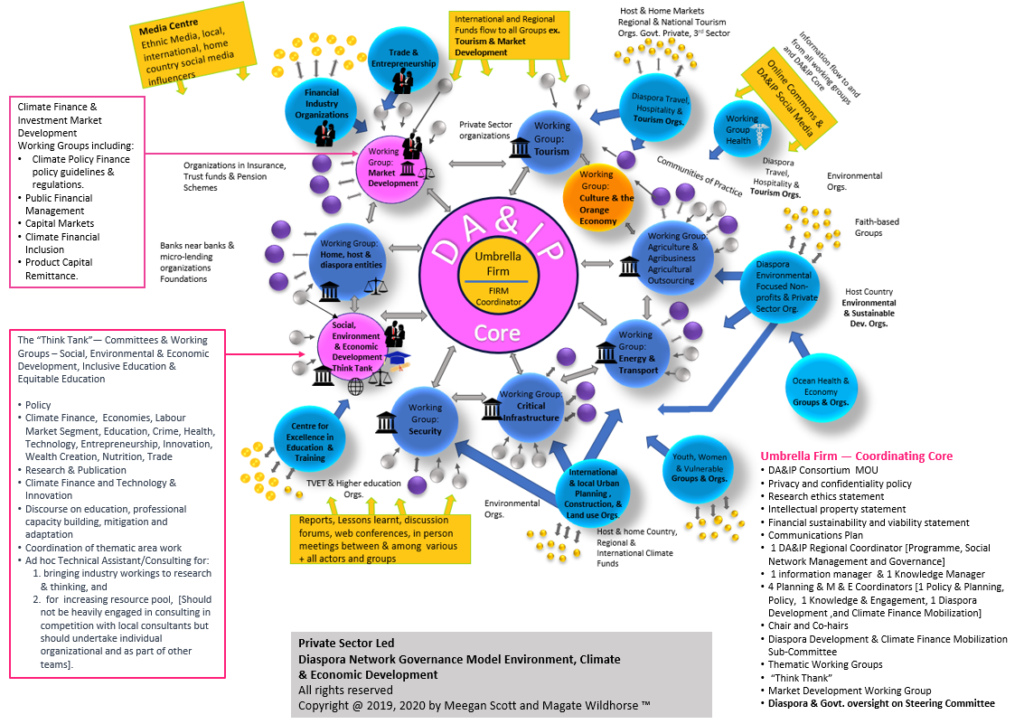It’s Global Entrepreneurship Week 2021 and we would love to hear your thoughts on the proposed diaspora private sector led development governance model for Jamaica and the Caribbean at home and in the diaspora.
Jamaican and Caribbean diasporans are committed to playing their role in the development of their home and host countries. However, they have not been effective in leveraging available resources for developing their communities in diasporic markets or in tapping available funding for contributing to the development of their home countries.
The United States of America is one rich example of a diasporic market in which significant funding for community development remains largely untouched by the community. A look at related policy implementation reports will confirm that Caribbean countries have drawn on much of the available resources but diaspora communities have scarcely touched the monies available to them.
The situation represents a complex developmental challenge which requires interventions for diaspora development as much as there is the need for diaspora led development initiatives for home countries. It is one in which the community suffers from scarce resources in the presence of abundant resources, capacity gaps, and community data and intelligence gaps. It is also one in which the failure of diasporans to appraise themselves of government, private sector and third sector priorities and initiatives have led to more discussions than real actions for driving growth and development (in both home and host countries).
So, let us celebrate #GEW2021 like only entrepreneurs know how—working on driving development.
It is true that many diasporans have done well for themselves but even more including our small businesses struggle. Though technology has allowed the community to become more connected there is little that the community can offer its newcomers, more seasoned and foreign-born members looking for jobs or trying to grow their businesses compared to other groups.
As diaspora entrepreneurs we have a significant role to play in helping to eradicate the large pockets of underdeveloped communities made up of Jamaican and Caribbean diasporans in developed countries. Our communities suffer poverty, crime, health, nutritional, environmental and educational challenges among others faced by our beloved home countries. In fact, we often export and import such challenges between host and home countries. It is therefore urgent that the issue of diaspora development be addressed in tandem with development of home countries. Too many diasporans live in the underdeveloped bubble of poverty in developed countries; and among them are highly educated immigrants and foreign born diasporans.
While the Jamaican and Caribbean diaspora contribute significantly to the economies of their home countries much more can be done. At times the community’s effort to do more is frustrated by lack of engagement by home country government departments. Both diasporans and governments are to be blamed for this challenge. Often diaspora businesses lack track record and local implementing partners to win government contracts and at other times “favouritism”, corruption, competition, and rules of procurement are to be blamed,
Issues related to trust, intellectual dishonesty, and the failure to practice collaboration and cooperation contribute to our struggles to develop at home and abroad.
Given, the challenge of developing both diaspora and home communities Meegan Scott and Magate Wildhorse have proposed the private sector led Jamaican and Caribbean Diaspora Network Governance Model for Environment, Climate and Economic Development.

Click the image above to enlarge image.
The core-periphery network governance mode for the community was developed in 2019, re-illustrated in 2020 and first shared with audiences in May 2020 at the Outride: COVID 19 Business Threat Seminar on Governance Model and Livelihood Protection and later at the BIDEM: Caribbean International Diaspora Entrepreneurs’ Conference and Trade Show held virtually in Toronto, 2020.
It proposes the use of a core coordinating organization that comprises diaspora and international partners (in diaspora and home countries), working groups, communities of practice, think tank, social media, academia, faith-based groups, environmental organizations, NGOs, private sector, tourism, youth, women and vulnerable groups and the ethnic media.
It involves market systems development, research, evaluation and sustainable financing. The thematic areas of focus are in alignment with host and home country sustainable development goals and their obligations under local Agenda 2030, diaspora and home country unique ambitions and global obligations related to the UN Sustainable Development Goals. The model includes working groups and communities of practice for:
- Trade and Entrepreneurship
- Security
- Critical Infrastructure
- A Centre for Excellence in Education and Training
- Urban Planning, Construction and Land Use
- Youth, Women and Vulnerable Groups
- Ocean Health and Economy
- Agriculture, Agricultural Outsourcing and Agri-business
- Health
- Energy and Transport
- Travel, Hospitality and Tourism
- Financial Industry; and the
- Orange Economy
The think tank has responsibility for home and diaspora related research and publication, dialogue, capacity building, advocacy and information dissemination, policy guidance and consulting on health, nutrition, climate finance, economies, labour market segments, technology, trade, inclusive and equitable education. The proposed working groups are detailed in illustration 2 below.

Click the image above to enlarge image.
The proposed structure will allow for more diasporans to deliver development solutions for profit or revenue, grow and strengthen diaspora and home country entrepreneurs and service providers as development partners in host and home country markets. Moreover, the model recognizes that organizations are limited by the scope of their missions and capabilities, that many individuals have shared and differing visions and missions. As such all will know they have a right and a responsibility to contribute to development without negative competition and the feeling that only selected individuals and organizations can lead and deliver development solutions.
In addition, the proposed local and international partnerships will better position diaspora entities to access monies available to them to deliver solutions in partnership with Jamaican and Caribbean based non-profits, private sector, government, development and or academic partners.
This Global Entrepreneurship Week we invite you to read this piece, review the illustrations and contact us with your comments and contributions. We feel confident that a private sector led model which creates decent jobs, take care of our people and planet at home and in the diaspora is the way to go. Do you?
Share your thoughts on social media or by email at: magate.wildhorse@gmail.com.
Copyright © 2021 by Meegan Scott and Magate Wildhorse. All rights reserved.










